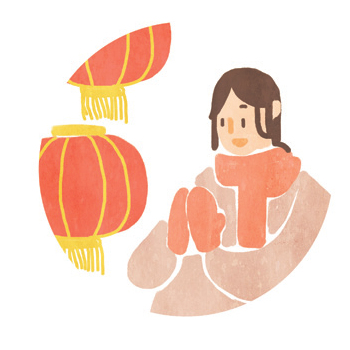
过节
Services
jiéqì fēnɡsú
节气风俗
Solar Terms and Customs

过节
Services
jiéqì fēnɡsú
节气风俗
Solar Terms and Customs
1. 立春、立夏、立秋、立冬 是 一 年
四 季 的 开始 。
The days of "Li Chun", "Li Xia",
"Li Qiu", and "Li Dong" mark the
beginning of the four seasons of
a year.
2. 你们 老家 立春 吃 不 吃 春饼?
Do people eat spring pancakes
on "Li Chun" in your hometown?
3. 一到 农历 “二月二”,理发 的 人
就 特别 多 。
People are used to getting their hair
cut on the 2nd day of the 2nd lunar
month (the Dragon Heads-Raising Day).
4. 谷雨 到 立夏 这 段 时间 全 村 人
最 忙 。
The period from "Gu Yu" (Grain Rain
Day) to "Li Xia" is the busiest time for
villagers.
5. 快 到 农历 三 月 初三 了,你
想 不 想 去 郊外 踏青 ?
The 3rd day of the 3rd lunar month is
approaching. Do you want to go to the
countryside to enjoy the spring?
6. 三伏天 尽量 少 在 户外 活动。
Try to avoid outdoor activities during
the "San Fu" (dog days of summer).
7. 过了 立秋 , 晚上 睡觉 就 得
盖 厚 被子 了 。
After "Li Qiu", we should tuck ourselves in
with thick quilts while sleeping
at night.
8. 冬至 北方 有 吃 饺子 的 习俗 。
It is a custom to eat dumplings on
"Dong Zhi" (Winter Solstice Day) in
Northern China.
9. 三九天 是 一 年 里 最 冷 的 日子 。
The 3rd nine-day period after the
Winter Solstice Day is the coldest
period of the year.
10. 腊月 初八 讲究 喝 腊八粥 ,
腌 腊八蒜 。
On Laba Festival (the 8th day of the
12th lunar month), we usually have Laba
congee and pickled Laba garlic.